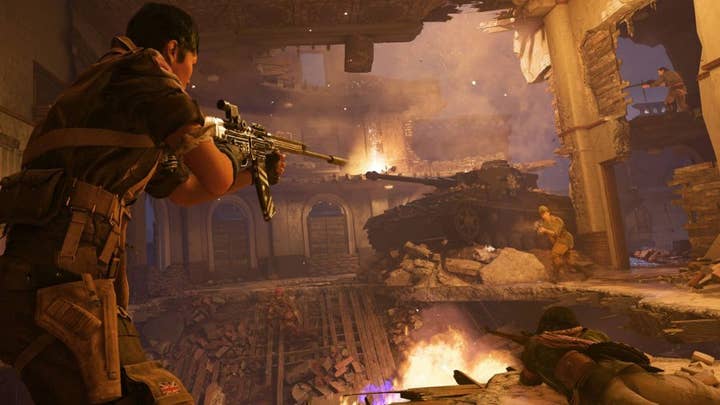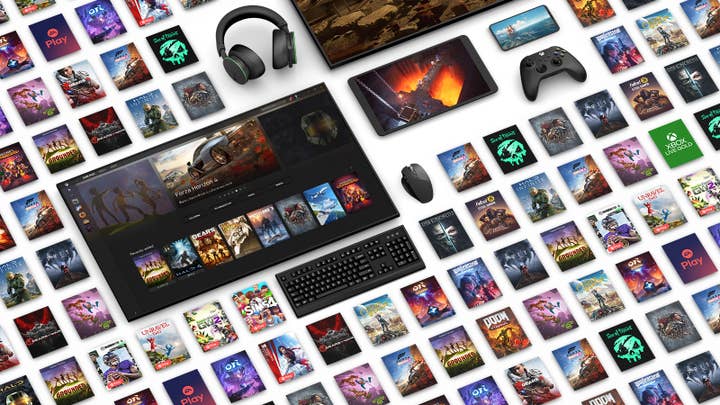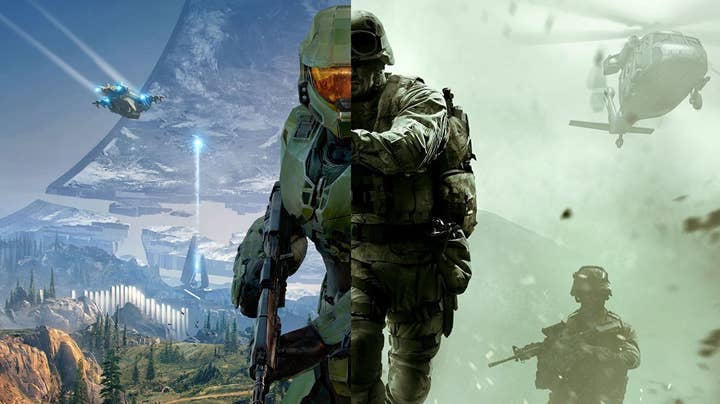"The deal that will change the industry forever": Analysts on Microsoft's Activision acquisition
Experts break down the biggest implications from the record-breaking $68.7 billion deal
The number of mergers and acquisitions taking place across the games industry has dramatically risen in recent years, but every now and then there's a deal that manages to stun everyone in the business.
Take-Two seemingly managed to achieve that with its $12.7 billion takeover of mobile giant Zynga, but yesterday Microsoft blew that out of the water with a proposed $68.7 billion acquisition of Activision Blizzard.
This is not only the biggest games M&A deal of recent years, or even the past decade, but the largest in the industry's history. In fact, GlobalData principal analyst Rupantar Guha goes further in declaring it the "biggest tech merger and acquisition" in history. As many have observed, it's only a few billion dollars shy of Disney's $71.3 billion acquisition of Fox, making the Microsoft-Activision deal one of the biggest in entertainment, not just gaming.
We reached out to a range of analysts to discuss the implications of the takeover, and all were as shocked as the rest of the industry.

"The deal is almost out of this world and will change the industry forever," Kantan Games' Dr Serkan Toto tells us, adding: "Microsoft's first-party studios have been, at least in my mind, behind Sony's for the longest time. It needed a big solution to catch up to Sony, and Bethesda was not enough: this deal can be a game changer for them."
Nick Parker of Parker Consulting says the deal underlines Microsoft's "obsessions to right the wrongs of the Xbox One era" and push Sony into third place behind itself and Nintendo. If supply issues are resolved this year, the addition of Activision Blizzard's franchises could finally make Xbox a tempting console for new adopters, he says.
Midia Research's senior analyst Karol Severin describes it as transformational for subscription adoption, the publisher landscape and the competition in both the console and cloud tech spaces.
Meanwhile, Niko Partners' president Lisa Cosmas Hanson says that the "sheer magnitude" of the deal is "stunning" and "a clear endorsement of the importance of the games industry globally."
DFC Intelligence owner David Cole was also surprised by the deal, adding: "It was known that something was likely to happen with Activision Blizzard. However, we did not expect a company like Microsoft to come in and acquire it all. Activision, Blizzard and King were really three unique companies and the speculation was they could be split up. For shareholders this is probably a best case scenario as the valuation is really solid. Microsoft was one of the only companies willing to swallow the whole pill so it was a surprise."
Beyond the obvious addition of both studios and IP to Microsoft's growing empire, it's worth looking at the additional gains the Xbox firm receives through this deal.
"Mobile gaming is critical for Microsoft to reach the three billion gamers worldwide"
Lisa Cosmas Hanson, Niko Partners
Niko's Cosmas Hanson observes that the expected addition of Activision Blizzard's various franchises to Game Pass will increase the subscription service's value and further position it as "a key entry point into video games."
"Importantly, this deal includes the acquisition of King and several other Activision-owned mobile game studios," she adds. "Mobile gaming is critical for Microsoft to reach the three billion gamers worldwide. The combination of HD console games for Xbox being available via cloud for mobile and other devices plus Activision's dedicated mobile games development will support Microsoft's goal of platform, IP and geographic expansion.
"Both entities have a strong footprint in Asia, which is the largest region in the world for the games industry -- we estimate it represents more than 60% of the global market revenue of PC and mobile gaming. Activision Blizzard has a stronger presence in Asia than Microsoft, perhaps because the latter has focused on console and most of Asia favors PC and mobile. In addition, the Japanese console brands dominate console gaming in Asia. The acquisition allows for several pieces of the video game industry puzzle to fit together nicely, on a global scale."
Harding-Rolls agrees, adding that the deal supports Microsoft's Game Pass strategy and decreases its reliance on third-party titles, which are "expensive to acquire."
"Generally, I think the IP acquired can be classed as Western-focused, which limits its impact in some key mobile-first markets globally," he continues. "It puts it into a stronger position versus Sony obviously, but also allows it to compete more effectively against Tencent, which also has an extensive mobile games and cloud services business."

Cole notes that Microsoft is increasingly able to go beyond competing with Sony in the console space, and instead compete against the likes of Google, Amazon, Facebook and Apple in the broader interactive entertainment sector.

"The games industry has become a much larger space and Sony and Nintendo struggle to compete at a higher strategic level," he explains. "So a long-term question is can Sony and Nintendo, the two smaller -- but still huge in the game space -- Japanese companies that have huge consumer appeal compete in the long term as the industry becomes much broader?
"It should also be noted that on the console side Call of Duty is really the only big franchise from Activision. The big issue is if COD becomes a Microsoft exclusive. Right now, I don't think [it will]. For one thing, it would be hard to get it past regulators if they want to lock the competition out."
Omdia's principal analyst George Jijiashvili draws parallels with last week's Take-Two/Zynga acquisition, in that this expands Microsoft's audience in both the mobile and casual gaming spaces, thanks largely to King. But there are still important benefits for the console business.
"The proposed date of completion -- fiscal year 2023 -- for the acquisition will coincide with when more casual gamers will be looking to pick up a new console," he says. "Making Call of Duty exclusive to Xbox -- or even just included as part of Game Pass -- could be a major benefit for Xbox when these consumers decide between Xbox Series or PS5.
"The only answer content-wise from Sony here would be to buy Take-Two, but that's unlikely"
Karol Severin, Midia Research
"Even so, this is more of a short-term uplift for Xbox -- its long-term aim is to create an all-encompassing, cross-device games ecosystem that goes beyond ownership of an Xbox console. While Xbox will remain committed to its console business as its main focus for at least the first half of this decade, we will likely see higher prioritisation of cloud and subscriptions towards the second half."
Transforming one of the biggest third-party video game publishers in a platform holder subsidiary will undeniably have an impact on the publishing space. There were concerns around the implications of Microsoft's Bethesda takeover, but Activision Blizzard is a much larger and even more successful firm.
Midia Research's Severin adds: "Traditionally, a small handful of publishers assured of an even playing field in the console ecosystem/content wars -- no matter which console consumers bought, the biggest hits have traditionally provided more or less a console-agnostic experience.
"The two biggest hits in this sense are Activision's Call of Duty and Take-Two's Grand Theft Auto -- played by 55% and 41% of console gamers, respectively. Nothing else in MIDiA's games tracker comes close. Fortnite and Assassin's Creed were played by 28% of console gamers, FIFA at 23%, Spider-Man at 17%. Now Microsoft will own the most played title, and with it potentially shift console gamers' content proposition deliberations in favour of Xbox."

Yesterday's news was met with concerns over consolidation among industry professionals on social media. Baird's senior analyst Colin Sebastian observed in his report that the video game consolidation of recent years "reflects the intensifying battle for content, resources and scale in an industry at the forefront of evolving digital media" -- and Microsoft, he writes, is leading this.

Cosmas Hanson refers to Niko Partners' 2022 predictions, one of which was that the games industry would see further consolidation this year.
"2021 was a record year for deals -- thanks in large part to Tencent's shopping spree -- and it's clear that 2022 is already breaking that record in terms of deal value," she says. "One has to wonder what Tencent might do next."
However, it's Sony's reaction that's at the forefront of analysts' minds -- although it's always worth reiterating that this acquisition is about a lot more than beating PlayStation.
Jijiashvili believes Sony is now "under huge pressure to respond" but notes its options are more limited because its pockets aren't quite as deep as those of Microsoft.
"Sony has been making number of acquisitions recently, but they've been much smaller in scale, and involved studios which they've had established relationships with," he says, referring to Sony's purchases of Housemarque, Bluepoint, Nixxes Software, Firesprite, Fabrik Games, Valkyrie Entertainment and the Evo fighting game tournament last year.
"The Activision Blizzard acquisition may force Sony's hand into making a bold move in relation to its subscriptions offering. Specifically, we may see Sony including some day one releases as part of their rumoured subscriptions revamp, in its bid to better compete with Game Pass.
"I also expect Sony to double down on its unique strengths, such as stronger back catalogue, PlayStation VR and Sony's other entertainment assets."
"Making Call of Duty exclusive to Xbox -- or even just included as part of Game Pass -- could be a major benefit for Xbox when these consumers decide between Xbox Series or PS5"
George Jijiashvili, Omdia
Severin adds: "The only answer content-wise from Sony here would be to buy Take-Two, but that's unlikely.
"At the time of writing, Microsoft's market cap is $2.3 trillion. Market cap-wise, making a $68.7 billion acquisition is like for Sony ($146 billion market cap) to make a $4.4 billion acquisition. So, there are not many meaningful content plays Sony can answer with, without potentially overstretching itself financially, in comparison to Microsoft.
"Sony has been outselling Xbox thus far, but the acquisition and subsequent consumer offerings could sway console gamer decision-making towards Microsoft in the mid-term."
The elephant in the room is, of course, the ongoing scrutiny and criticism against Activision Blizzard over allegations of discrimination, abuse, toxicity in the workplace, and violations of equity pay and civil rights laws, as well as the multiple lawsuits filed against the publisher over these issues.
Harding-Rolls speculates that the lawsuits may have contributed to the acquisition process -- "helped open the door, so to speak" -- and he may well be right.
Activision's share price was in decline for much of 2021, although accelerated by the backlash that followed these revelations. Between the beginning of February (when the publisher announced record full-year financial results) and the end of July when the first lawsuit was filed, its shares dropped 7%. From the lawsuit to just before the acquisition news, it fell 28% -- and that was despite a little recovery over the Christmas holidays.

Harding-Rolls believes Microsoft will position its takeover as a "fresh start for Activision Blizzard," adding: "Generally, Microsoft has a hands-off approach to managing its games acquisitions, but this may be a case where closer oversight will be needed to make sure the cultural challenges are being effectively dealt with. I expect Microsoft to be proactive in this regards."

Microsoft CEO Satya Nadella has already addressed this in an investor call regarding the acquisition, assuring that the culture of his organisation -- including Activision Blizzard -- is his number one priority.
"We are supportive of the goals and the work Activision Blizzard is doing, and we also recognise that after close, we will have significant work to do in order to continue to build a culture where everyone can do their best work," he said.
Toto adds: "The lawsuits will be Microsoft's problem soon, and I have more faith in Phil Spencer solving them than in Bobby Kotick pretending to try the same. In the long run, Kotick will leave -- there is no way around it in my mind. I am not sure what will happen to Blizzard's leadership, but things are not looking as scandalous at King, so at least the mobile side should be fine."
Parker observes that the culture between the offices at Microsoft, Activision and Blizzard are very different, suggesting Microsoft will have its work cut out imposing its own corporate style and ethics onto its latest purchase.
"I'm not sure this will be a smooth integration," he says. "I don't expect Bobby Kotick would report to anybody so maybe he'll consider that he's work is done and move on eventually."
Perhaps inevitably, one of the biggest current buzzwords has already been attached to the news, with even Satya Nadella discussing how it plays into the company's metaverse ambitions.
In his report, GlobalData's Rupantar Guha said: "While the metaverse is still largely conceptual, Microsoft's strength in underlying themes such as artificial intelligence, augmented reality, virtual reality, and cloud computing give it a leadership position in this theme. Activision's games will help Microsoft create metaverse experiences and provide an established global consumer base to test and market them."
"The lawsuits will be Microsoft's problem soon, and I have more faith in Phil Spencer solving them than in Bobby Kotick pretending to try the same"
Dr Serkan Toto, Kantan Games
The implications for cloud computing and, on a related note, cloud gaming are something analysts are particularly interested in around this acquisition. Severin notes that cloud is an important business for Microsoft, and that Activision currently uses Google Cloud following a multi-year deal announced in 2020.
"Over time, Microsoft can bring Activision onto its own cloud infrastructure and services," he says. "That's a big account for any cloud services player. It also means a market share tailwind for Microsoft's cloud business over the next couple of years, and simultaneously a headwind for competitors who are being dethroned, as the transition unfolds."
Jijiashvili says Microsoft's investment in cloud gaming is accelerating the wider industry's shift to this model, which will naturally benefit Microsoft in various ways. After all, it's already working with Sony on cloud technology. "As more publishers, game makers and device manufacturers make moves in this space, Microsoft will be well positioned to offer solutions across the whole value chain to aspiring cloud gaming providers."
There are wider possibilities that are opened up by this industry-changing deal, many of which are unknown.
Severin suggests the acquisition of Activision may enable Microsoft to steal market share from Steam: "Call of Duty is popular on PC too -- 33% of PC gamers played Call of Duty in Q3 2021 across US, UK, Canada, Australia. Microsoft could eventually take Call of Duty off Steam, in order to usher PC gamers towards Game Pass as their key distribution channel."
Several analysts question how smooth the acquisition process will be, and whether it might be blocked at all. Coles suggests getting regulatory approval may be an issue, adding: "When Activision acquired Blizzard in 2008, US and European regulators were all over the deal. This is a much bigger deal."
Jijiashvili is more optimistic: "Microsoft has managed to avoid the levels of regulatory scrutiny which the likes of Meta currently face, but the size of this acquisition will no doubt turn heads. I expect this deal to get a good looking at, but I don't think it will blocked on anti-trust laws."
Finally, Parker Consulting's Nick Parker emphasises that it's impossible to fully understand the impact of this deal at this early stage.
"It's unknown whether Sony would lose access to all the triple AAA IP or Microsoft would seek to maximise the opportunity of the IP across a larger addressable hardware market," he says. "Gamers will have their say if Microsoft starts to flex its monopolistic muscles and gate players from access to the IP through competitive platforms.
"Also, how Microsoft will oversee the direction of King and mobile strategies and exploit them for the greater good of the corporation, not just Xbox, will be interesting."

